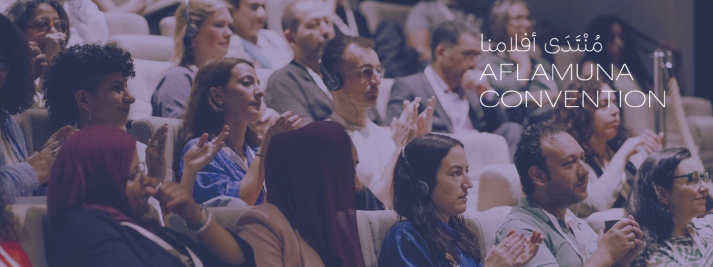
AFLAMUNA, formerly known as Beirut DC, proudly announces the successful completion of the first AFLAMUNA Convention held at the “École Supérieure des Affaires” in Beirut on June 8th, 9th, and 10th, 2023.
The event brought together filmmakers with actors from across independent culture and civil society, including cultural organizers, CSO representatives, activists, journalists, funders, and practitioners interested in building up the Narrative Shift Ecosystem of the Arab region.
Over 100 attendees from over 30 countries gathered to discuss some of the most pressing issues facing our community today to create and consolidate partnerships, to inspire and be inspired by upcoming film and impact campaign projects, and to collectively imagine solutions and horizons from an independent film sector that can elevate our societies.
The convention started with a panel discussion on the current state of Civil Society in the Arab region, with representatives from Maharat, Human Rights Watch, Seeds for Legal Initiatives, and the Febrayer Network. The session and the discussion that ensued painted a worrying picture of a regional civic space that continues to be restricted and to shrink, oppressive regimes that also know how to use arts and culture to advance their own goals, and a global imaginary crisis we seem to be facing.
The AFLAMUNA Convention’s main aim was to propose Narrative Shift Strategies as one of the tools at our disposal to resist these imposed realities. To that end, Cara Mertes from IRIS (International Resource for Impact and Storytelling) and Egyptian producer Mostafa Youssef (Seen Films) presented “The Science Behind Narrative Shift”. Zeina Daccache took us through her uncanny journey into her unique practice of social theatre, filmmaking, and advocacy. Jessica Nordström Sikkar from the Swedish Postcode Foundation and Aline Gemayel from the Heinrich Böll Foundation explained how supporting impact campaigns can elevate their institutions’ goals, with the example of Album’s (by Omar Gabriel) for whom HBS was a central partner. AFLAMUNA’s team also presented the success story of Lift Like a Girl by Mayye Zayed, which we’ve supported at various stages.
One of the most popular parts of the event was the pitch session of the film teams selected for our inaugural AFLAMUNA Impact Fellowship. This ongoing program that aims to train a cohort of 10 professionally dedicated Impact Producers from the region paired these fellows up with four film projects tackling stories of environmental researchers in Egypt, the fractured historical landscapes of Lebanon, forced displacement and statelessness in Europe, and the collective memory of Palestinians forbidden from returning to their homeland. The films and the initial impact campaigns designed within the framework of the fellowship were pitched to all attendees to encourage potential partnerships and benefit from the collective wisdom of the room to great success.
On the final day, we shed light on some of the structural foundations necessary for a robust ecosystem. Researchers Jennifer Romanos and Alaa Hajar presented AFLAMUNA’s exhaustive study on the Safety and Security of Independent Filmmakers in the Arab region and our soon-to-be-published Red Guide. Finally, the attendees were invited to participate in an open discussion about the everlasting issue of distribution. The conversation focused on advancing radically alternative ways to approach this essential and chronically underdeveloped element of our ecosystem, including the opportunities and pitfalls of self-distribution, which often imposes itself on independent filmmakers. Some of the ideas shared by the speakers were an ambitious concept for an international independent streaming service and the simple but wide-reaching Masahat AFLAMUNA program, which hopes to catalyze the return of community cinemas across the Arab region.
These different inputs catalyzed a myriad of conversations inside and outside the room, embracing all of the complexity of our region, our field, and the current state of the world. The AFLAMUNA Convention came as the culmination of our efforts for the past few years, creating a safe space where attendees were able to share and voice their challenges, their concerns, and their ideas for a path forward. We are proud to have witnessed a real conversation and a collision of worlds between independent film practitioners and actors from across civil society.
AFLAMUNA thanks all of the partners, attendees, speakers, team members, and filmmakers that made this event possible and all the practitioners and thinkers who inspired it.